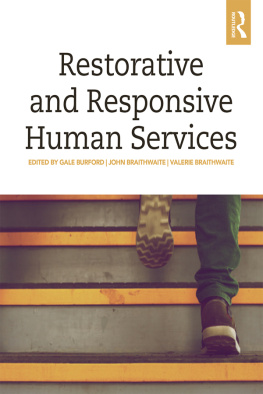ADVANCE PRAISE FOR
Focus Groups:
Culturally Responsive Approaches
for Qualitative Inquiry and
Program Evaluation
Dr. Hall artfully demonstrates how to use culturally responsive focus groups for social justice through practical research techniques and case examples that show how the researcher can be an agent of change and give a voice to marginalized communities.
Stacy Penna, Ed.D.
NVivo Community Director
QSR International
Focus GroupsQUALITATIVE RESEARCH METHODOLOGIES: TRADITIONS,
DESIGNS, AND PEDAGOGIES
Kathleen deMarrais; Melissa Freeman; Jori N. Hall; Kathy Roulston, Editors
The Qualitative Research Methodologies: Traditions, Designs, and Pedagogies series is designed to encourage qualitative researchers to look both backward and forward in the field of qualitative inquiry. We invite authors to submit proposals for both single-authored books and edited volumes focused on particular qualitative designs situated within their historical, theoretical, and disciplinary/cross disciplinary contexts. Pieces might include a traditions or designs historical roots and key scholars, ways the approach has changed over time, as well as ethical and methodological considerations in the use of that particular research approach. They may also provide an introduction to contemporary designs created at the intersection of multiple, theoretical, and often assumed incommensurable historical paths. In addition, we encourage authors to submit proposals for books focused on the pedagogy of qualitative research methodologies that interrogate how we prepare researchers new to qualitative research methodologies with the theoretical, methodological, and ethical understandings and skills for their work.
BOOKS IN THE SERIES
Focus Groups: Culturally Responsive Approaches
for Qualitative Inquiry and Program Evaluation
by Jori N. Hall (2020)
Exploring the Archives:
A Beginners Guide for Qualitative Researchers
by Kathryn Roulston and Kathleen deMarrais (2021)
Those interested in being considered for inclusion in the series should send a prospectus (https://zfrmz.com/rmlvGq7xgL2RTgPkByk9), CV, and cover letter to:
Kathleen deMarrais
Focus Groups
Culturally Responsive Approaches
for Qualitative Inquiry
and Program Evaluation
By Jori N. Hall
Copyright 2020 | Myers Education Press, LLC
Published by Myers Education Press, LLC
P.O. Box 424 Gorham, ME 04038
All rights reserved. No part of this book may be reprinted or reproduced in any form or by any electronic, mechanical, or other means, now known or hereafter invented, including photocopying, recording, and information storage and retrieval, without permission in writing from the publisher.
Myers Education Press is an academic publisher specializing in books, e-books, and digital content in the field of education. All of our books are subjected to a rigorous peer review process and produced in compliance with the standards of the Council on Library and Information Resources.
Library of Congress Cataloging-in-Publication Data available from Library of Congress.
13-digit ISBN 978-1-9755-0193-8 (paperback)
13-digit ISBN 978-1-9755-0192-1 (hard cover)
13-digit ISBN 978-1-9755-0194-5 (library networkable e-edition)
13-digit ISBN 978-1-9755-0195-2 (consumer e-edition)
Printed in the United States of America.
All first editions printed on acid-free paper that meets the American National Standards Institute Z39-48 standard.
Books published by Myers Education Press may be purchased at special quantity discount rates for groups, workshops, training organizations, and classroom usage. Please call our customer service department at 1-800-232-0223 for details.
Cover design by Teresa Lagrange.
Visit us on the web at www.myersedpress.com to browse our complete list of titles.
ACKNOWLEDGMENTS
I would like to acknowledge my friends and family who supported me during the writing of this book. Your care throughout this process was invaluable. A special thanks to the PhD students, contributors and colleagues who provided thoughtful feedback, offered narrative accounts of culturally responsive focus groups in practice and advanced critical thinking on how to address social inequities through culturally responsive focus group inquiry. I am indebted to each of you.
PREFACE
A S THE WORLD BECOMES more diverse, it becomes increasingly imperative to conceptualize and utilize methods in ways that are responsive to the uniqueness of participants and programs, as well as to a particular research design. Accordingly, this book, Focus Groups: Culturally Responsive Approaches for Qualitative Inquiry and Program Evaluation, takes an in-depth look at how to develop and implement culturally responsive focus groups within the context of qualitative inquiry and program evaluation. The purpose of this book is twofold: (1) advance a culturally responsive stance that treats focus groups as sites of social justice and (2) showcase how various forms of focus groups attend to the cultural contexts of prioritized communities as well as address inquiry goals. To support these purposes, practical guidance on focus groups and cross-disciplinary case examples from culturally responsive researchers and evaluators are woven throughout the book.
sets the stage for the text, presenting foundational information, including the definition of focus groups, an articulation of the culturally responsive stance used to frame the book, and a brief historical review of qualitative research and program evaluation.
discusses key components of inquiry design, emphasizing how inquiry components interact with each other and how the inquiry components are intended to advance cultural responsiveness. Here I discuss common design options or methodologies that are compatible with focus groups, the appropriateness of focus groups for your design, and other important aspects of inquiry design such as participant sampling and recruitment. The chapter ends with a discussion of ethics, focusing on the role of ethics committees, gatekeepers, and informed consent.
begins with a discussion on how to develop a focus group protocol and offers strategies to meaningfully engage focus group participants. Next, I turn my attention to describing the moderator role. I outline the facilitation skills required to moderate a focus group and explicate the role of the moderator as a research instrument and agent for change.
, I offer readers multicultural validity and inquirer reflexivity as criteria for establishing focus group quality. I give a range of techniques and mechanisms for applying these criteria and ensuring design components are culturally congruent with participants concerns. Finally, I present a case example to underscore some of the key points made in the chapter.
examines pertinent aspects to consider when developing and implementing culturally responsive focus groups with youths and older adults. The case examples from evaluators featured in this chapter demonstrate how different culturally responsive techniques (i.e., strength-based theories, photo-elicitation) were applied to focus groups to address the linguistic diversity of youth participants and to accommodate the varying cognitive abilities of older adults.







